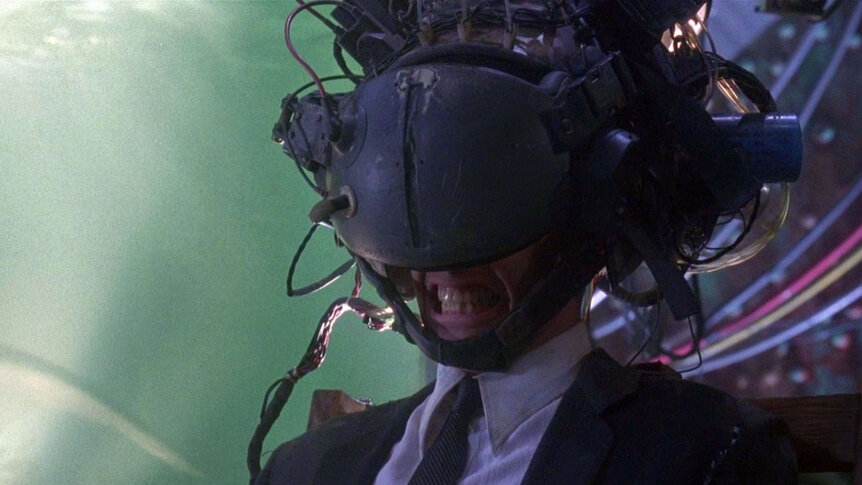Create a free profile to get unlimited access to exclusive videos, sweepstakes, and more!
Can technology make you sick, like 'NAS' does in Johnny Mnemonic?

Johnny Mnemonic is the sort of movie you either love or hate, and either of those reactions is perfectly justified. Critical response and the box office were not kind when the movie released in 1995, but in the intervening years, the film found something of a cult following — likely owing to our undying love for Keanu Reeves and the charming retrofuture visions of '90s-era cyberpunk.
And, there’s one more reason to give Johnny Mnemonic another chance: We’re about to line up with it on the calendar. The movie takes place in the second half of January 2021 and imagines a world ruled by corporations and beset by a pandemic. Yikes.
The pandemic in question in the movie, Nerve Attenuation Syndrome (NAS), doesn’t get a clear explanation in the film. Instead, it’s spoken of in vague terms, the apparent result of exposure to too much technology. “What causes it? The world causes it. This causes it! This causes it! This causes it!" a doctor named Spider (Henry Rollins) laments at one point, gesturing to various bits of tech. "INFORMATION OVERLOAD! All the electronics around you poisoning the airwaves.”
Spider's rant and the general idea that technology makes people physically sick echoes prior concerns about cancers resulting from cell phone usage — or the more recent (and easily debunkable) 5G conspiracies. More generally, it hints at concerns of exposure to the endless stream of information present on the internet. While certain elements of Johnny Mnemonic are clearly beyond our current reality, some of them are pretty close to the mark.
What about NAS? Is there any evidence of disease or disorder resulting from our technological addiction?
RADIATION CALLING?
The question of whether cell phones pose a risk to our health has been around just about as long as cell phones themselves. The concern is persistent enough that both the CDC and FDA have pages dedicated to the question.
The root of the worry seems to stem from a few basic facts. We know some forms of radiation cause cancers or other health problems, and we do spend an awful lot of time with our cell phones in our pockets, in our hands, or pressed against our heads. It makes a sort of intuitive sense. Holding a piece of radiating equipment in close proximity to your body for — *checks watch* — all of the time, could be cause for concern.
Here’s what we know.
Do cell phones emit radiation? Yes. But so do bananas, kitty litter, and your own body. Like, so many things are radioactive! Radiation has become a buzzword eliciting fright among all who hear it, probably owing to a handful of legitimately terrible nuclear accidents and, of course, the closing events of World War II. But most radiation is harmless. In fact, without radiation, we wouldn’t be here today. The Sun radiates onto the planet’s surface allowing plants to thrive. And the evolution of life on Earth might not have unfolded as it has without radiation.
According to the FDA, cell phones do emit low levels of non-ionizing radiation, the kind that comes from electric and magnetic fields, though there is as yet no evidence to suggest a link to any health effects. Research is ongoing. When it comes to danger from cell phone use, our biggest concern is that they're a distraction, especially while driving. Though, if you are concerned, the CDC offers some suggestions to limit your exposure. Take your guidance from them, not street doctors operating in dingy kipple-filled garages.
TOO MUCH TECH
The real risk of exposure to technology might exist not in the technology itself, but in our relationship to it. It’s true that excessive internet usage is linked to depression. What’s unclear is which factor is the instigator. One interpretation of the data suggests that excessive internet usage causes depression. This makes intuitive sense as the information most readily available online is overwhelmingly negative. Another interpretation is that those predisposed to depression exhibit higher internet usage.
This relationship crystallized a while back in stories of Japan's Hikikomori, a generation of individuals (mostly men) who chose to isolate themselves from society, spending most of their time online or playing video games. There were even stories of people dying from extended periods of gameplay in internet cafes. But more recent insight indicates the source of Hikikomori is societal, not technological. Instead, it seems societal expectations and a lack of opportunity may be to blame.
Still, the information superhighway builds new lanes every day and each of us is inundated with more and more information, all of it requiring our attention all the time. This relationship does have an impact on our ability to operate and may be exacerbated by isolation during the current pandemic.
The constant deluge of information may cause mental exhaustion and poor decision making. The unending flood of emails, streams, and notifications never give us time to process, resulting in poor decision making.
An email comes in and before you have time to digest and respond, something else pops into your respective feeds. While responding to one thing you’re already thinking about the next. We live in a state of unending multitasking. One thing steals from the last. The result: mental exhaustion and anxiety. Without concerted efforts to stem the tide, the cycle never ends.
NAS or the Black Shakes, the physiological disease showcased in Johnny Mnemonic, has yet to rear its head, but the psychological impact of constant information demanding attention can have real consequences. And we all need to be aware of where we devote our attention, what society is demanding from us, and how we navigate an ever-changing and increasingly digital landscape.
There are no cybernetic dolphins to save us.



























